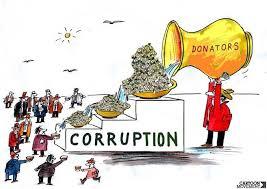Focus on Africa- Agents of Scapegoating Practices in Nigerian Politics. By Hugo Keji

Scapegoating is a pervasive strategy employed by politicians across various levels of government in Nigeria. This section will focus on how different political figures—senators, federal and state house members, local government officials, and federal ministers—participate in and perpetuate scapegoating practices.
Case Studies - Agents of Scapegoating in Nigerian Politics
In Nigeria, the practice of scapegoating is not limited to any single tier of government. Politicians at every level—from the federal to the local—use this tactic to deflect blame and maintain their political positions. Here’s how different political agents are involved:
-
Nigerian Senate and Federal House of Representatives
- Role: Members of the Nigerian Senate and House of Representatives wield significant influence over national policy and public opinion. They often engage in scapegoating to divert attention from legislative failures and to undermine political opponents.
- Examples:
- Boko Haram Insurgency: Senators and representatives from both the ruling party and opposition have accused each other of complicity or negligence regarding the Boko Haram crisis. By blaming political rivals, they deflect criticism from their inability to formulate effective security policies.
- Economic Issues: During economic downturns, legislators have often pointed fingers at opposing political figures or regional leaders, attributing economic failures to alleged corruption or mismanagement by specific individuals or groups.
- Impact: This scapegoating creates a highly polarized political environment, reducing the likelihood of bipartisan cooperation needed to address national issues.
-
State Houses of Assembly
- Role: State legislators are key players in regional politics and often scapegoat other regions or ethnic groups to consolidate support within their constituencies.
- Examples:
- Fulani Herdsmen Crisis: State legislators in farming regions frequently blame Fulani herdsmen for violence and property destruction, while legislators from Fulani-dominated areas might blame the farmers, deepening ethnic divisions.
- Resource Allocation: Disputes over resource allocation often lead to scapegoating between states, with legislators accusing neighboring states or the federal government of unfair practices.
- Impact: Such actions exacerbate regional tensions and hinder cooperative development efforts, perpetuating cycles of conflict and underdevelopment.
AfriPrime App link: FREE to download...
https://www.amazon.com/Africircle-AfriPrime/dp/B0D2M3F2JT
-
Local Government Officials
- Role: Local government officials are closest to the grassroots and often use scapegoating to manage local discontent and distract from administrative inefficiencies.
- Examples:
- Communal Conflicts: Local leaders might blame ethnic minorities or migrant communities for local conflicts or economic issues, deflecting attention from their own governance failures.
- Infrastructure Failures: Poor infrastructure is often attributed to sabotage by political opponents rather than acknowledged as a result of corruption or mismanagement.
- Impact: This scapegoating disrupts community cohesion and stalls local development initiatives, leading to persistent local instability.
-
Federal Ministers
- Role: Federal ministers, as part of the executive branch, are responsible for national policies and administration. They often engage in scapegoating to protect their ministries from criticism and to align with the political narratives of the ruling party.
- Examples:
- Health Crises: During health crises like the COVID-19 pandemic, ministers might blame non-compliant citizens or opposition-led states for the spread of the virus, avoiding scrutiny of their response strategies.
- Economic Policies: Economic failures are frequently attributed to external factors or previous administrations, allowing current ministers to evade responsibility for ineffective policies.
- Impact: This scapegoating erodes public trust in federal institutions and hinders the implementation of effective policies, as it prevents honest assessments and accountability.
Politicians across all levels of government in Nigeria engage in scapegoating practices to deflect blame and maintain power. Senators, federal and state house members, local government officials, and federal ministers each use this tactic to manipulate public perception and protect their political interests. The pervasive nature of scapegoating in Nigerian politics exacerbates societal divisions, undermines governance, and stalls national development. Addressing this issue requires a concerted effort to promote transparency, accountability, and inclusive political dialogue, ensuring that leaders are held responsible for their actions and that genuine solutions are pursued.
AfriPrime App link: FREE to download...
- Questions and Answers
- Opinion
- Motivational and Inspiring Story
- Technology
- Live and Let live
- Focus
- Geopolitics
- Military-Arms/Equipment
- Segurança
- Economy
- Beasts of Nations
- Machine Tools-The “Mother Industry”
- Art
- Causes
- Crafts
- Dance
- Drinks
- Film/Movie
- Fitness
- Food
- Jogos
- Gardening
- Health
- Início
- Literature
- Music
- Networking
- Outro
- Party
- Religion
- Shopping
- Sports
- Theater
- Health and Wellness
- News
- Culture

